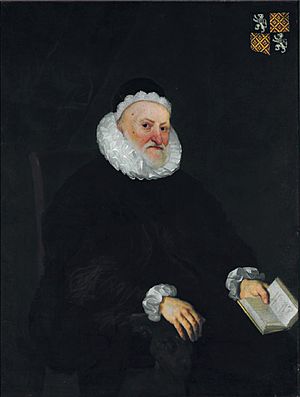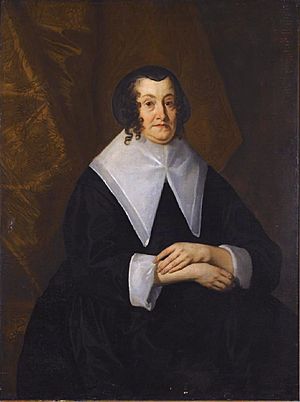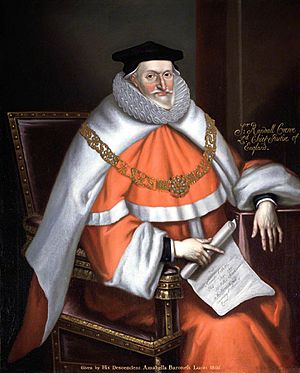Ranulph Crewe facts for kids
Quick facts for kids
Sir Ranulph Crewe
|
|
|---|---|

Sir Ranulph Crewe, by Peter Lely
|
|
| Lord Chief Justice of the King's Bench | |
| In office 1625–1626 |
|
| Preceded by | James Ley |
| Succeeded by | Nicholas Hyde |
| Personal details | |
| Born | 1558 |
| Died | 3 January 1645-6 Westminster |
| Resting place | Barthomley |
| Alma mater | Christ's College, Cambridge |
Sir Ranulph Crewe (1558 – 3 January 1646) was an important English judge. He became the Chief Justice of the King's Bench. This was a very high position in the legal system of his time. He was known for his strong beliefs and his refusal to agree with the king on certain matters.
Contents
Early Life and Education
Ranulph Crewe was born in 1558. His father, John Crew, lived in Nantwich. Ranulph went to Shrewsbury School when he was younger. Later, in 1576, he attended Christ's College at Cambridge University.
He did not finish his degree at Cambridge. However, he decided to study law. He joined Lincoln's Inn in 1577. This was one of the places where future lawyers trained. He became a lawyer, or was "called to the bar," in 1584.
Starting His Legal Career
Ranulph Crewe began his career as a lawyer. In 1597, he became a member of Parliament for Brackley. He was elected as a "Bencher" at Lincoln's Inn in 1600. This was a senior position among the lawyers there.
His first known court case was in 1597. He worked alongside a famous lawyer named Edward Coke. In 1604, Parliament chose him for an important task. He had to explain why they disagreed with the king's new title. The king wanted to be called "King of Great Britain."
Important Cases and Roles
Ranulph Crewe continued to be involved in public life. He was a Member of Parliament for Saltash in 1614. In the same year, he was chosen to be the Speaker of the House of Commons. This meant he led the meetings of Parliament.
He was knighted in June 1615. This gave him the title "Sir." Soon after, he became a "serjeant-at-law." This was a special rank for senior lawyers.
The Peacham Case
In 1615, Crewe was part of a group examining a minister named Edmond Peacham. Peacham was accused of high treason. This was a very serious crime against the king. Peacham had written some strong criticisms of the king. These writings were never published.
Crewe and most other judges believed Peacham's writings were treason. However, another famous judge, Edward Coke, disagreed. Peacham was found guilty and sentenced to death. He later died in prison.
The Leicester Witch Trials
Crewe also served as a judge in the Leicester boy Witch Trials. A young boy named John Smith claimed to have seen witches. Crewe and another judge believed the boy. However, King James later said the boy was lying. This case affected Crewe's reputation.
Other Key Prosecutions
Crewe was involved in many other important legal cases. In 1615, he helped try Richard Weston for murder. He also worked with Francis Bacon to prosecute the Earl and Countess of Somerset. They were accused of being involved in the same murder case.
In 1621, Crewe prosecuted Henry Yelverton. Yelverton was the Attorney General. He was accused of misusing his power with certain patents. Crewe also prosecuted Sir Francis Mitchell for corruption.
He helped settle an important legal rule about "impeachment." This is when Parliament accuses a public official of wrongdoing. Crewe used an old case from the time of Henry IV to help decide a dispute between the House of Commons and the House of Lords.
Becoming Lord Chief Justice
On January 26, 1625, King James I made Ranulph Crewe the Chief Justice of the King's Bench. This was the highest judicial position in England. He was now in charge of the most important court.
However, his time as Chief Justice was short. On November 9, 1626, King Charles I removed him from his position. This happened because Crewe refused to sign a document. The document said that the king could force people to give him loans. Crewe believed this was against the law. He was the only judge punished for this refusal.
The Oxford Peerage Case
One famous part of Crewe's career was his speech in the Oxford peerage case in 1625. A "peerage" is a noble title, like an Earl. Crewe spoke about how old and important the Crewe family was. He also gave a famous speech about how everything changes over time.
He said, "Time has its revolutions, and there must be an end to all temporal things." He wondered where famous old families like "Bohun" or "Plantagenet" were now. He said they were "entombed in the urns and sepulchres of mortality." But he hoped the "De Vere" family's title would last "as long as it pleases God."
Retirement and Later Life
After being removed from his job, Crewe hoped to get some help from the Duke of Buckingham. But the Duke was assassinated. Crewe then asked King Charles I directly for help, but he did not get any.
He spent the rest of his life in retirement. He lived partly in London and partly at his home, Crewe Hall. He had bought the land for Crewe Hall in 1608. It was in Barthomley, Cheshire.
During the English Civil War, Crewe Hall was used by Parliament's forces. It was captured by one side and then retaken by the other. Ranulph Crewe died in Westminster on January 3, 1646. He was buried in a chapel he built at Barthomley.
Family Life

Sir Ranulph Crewe was married twice.
- His first wife was Julia Clipsby. They married on July 20, 1598. She passed away in 1603.
- His second wife was Julia Fasey. They married on April 12, 1607. She was a widow of another lawyer. Her wealth helped Ranulph buy his estate at Barthomley. She passed away in 1629.
With his first wife, he had two sons. Their names were Clipsby Crew and John Crew. Both of his sons also became Members of Parliament.
Images for kids
 | Charles R. Drew |
 | Benjamin Banneker |
 | Jane C. Wright |
 | Roger Arliner Young |




